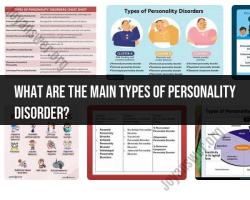What is the true meaning of an introvert?
The true meaning of an introvert relates to a person's preferred way of interacting with and gaining energy from the world around them. Introversion is one of the key dimensions of personality, as described by various personality theories such as the Myers-Briggs Type Indicator (MBTI) or the Big Five personality traits.
Here are some essential characteristics associated with introversion:
Energy Source: Introverts tend to recharge and regain their energy through spending time alone. They often find social interactions, especially in large groups, to be draining, and they need solitary time to reflect and recharge.
Preference for Depth: Introverts typically prefer deep, meaningful conversations with a few close friends rather than engaging in small talk with a large number of acquaintances. They may value quality over quantity in their relationships.
Reflective and Thoughtful: Introverts often exhibit a preference for introspection and thoughtfulness. They may spend more time processing information internally before expressing their thoughts, and they may be drawn to activities that allow for reflection.
Selective Socializing: While introverts may not shy away from social interactions altogether, they are likely to be selective about the company they keep. They may prefer one-on-one or small group interactions rather than large social gatherings.
Independent: Introverts often value independence and autonomy. They may enjoy working alone and may be self-sufficient when it comes to accomplishing tasks or pursuing personal interests.
Prefer Quiet Environments: Introverts are generally more sensitive to external stimuli, such as noise and crowds. They may feel more comfortable and focused in quieter environments, where they can avoid overstimulation.
It's important to note that introversion is not the same as shyness or social anxiety. Introverts may enjoy socializing, but they may prefer smaller, more intimate settings. Additionally, introversion is not a binary trait; it exists on a spectrum. Some people may exhibit more introverted tendencies, while others may fall closer to the extroverted end of the spectrum.
Understanding and appreciating introversion can contribute to better communication and collaboration in various settings, whether it be in the workplace, social circles, or personal relationships. It's crucial to recognize that introversion is a normal and valid personality trait, and individuals may differ in their preferences for social interaction and solitude.
Unveiling introversion: The true meaning and characteristics
Introversion is a personality trait characterized by a preference for quiet, minimally stimulating environments. Introverts are often described as being reserved, thoughtful, and introspective. They may need more time to recharge after social interactions and may prefer to spend time alone or in small groups.
Some common characteristics of introverts include:
- They prefer quiet environments and may find loud or crowded places overwhelming.
- They tend to be more reserved and less outgoing than extroverts.
- They need more time to process their thoughts and feelings before speaking.
- They are often good listeners and enjoy having deep conversations.
- They may prefer to spend time alone or in small groups rather than large gatherings.
Introversion vs. shyness: Understanding the distinctions
Introversion and shyness are often confused, but they are two distinct concepts. Introversion is a personality trait, while shyness is a fear of negative social evaluation. Introverts may or may not be shy, and shy people may or may not be introverted.
Here is a table that summarizes the key differences between introversion and shyness:
| Characteristic | Introversion | Shyness |
|---|---|---|
| Definition | A personality trait characterized by a preference for quiet, minimally stimulating environments. | A fear of negative social evaluation. |
| Social interaction | Introverts may enjoy social interaction, but they may need more time to recharge afterwards. | Shy people may avoid social interaction altogether or experience anxiety when socializing. |
| Self-awareness | Introverts are often highly self-aware and enjoy spending time alone to reflect on their thoughts and feelings. | Shy people may be less self-aware and may focus on their fears and worries when socializing. |
| Comfort in social situations | Introverts may be comfortable in social situations, but they may prefer to spend time with a small group of close friends or family members. | Shy people may feel uncomfortable in any social situation, even with people they know well. |
Navigating social dynamics: How introverts thrive in various settings
Introverts can thrive in a variety of settings, but they may need to be strategic about how they manage their energy and social interactions. Here are a few tips for introverts:
- Choose your social engagements wisely. Don't feel obligated to attend every event or gathering. Instead, focus on spending time with people and doing activities that you enjoy.
- Take breaks when you need them. If you start to feel overwhelmed in a social situation, excuse yourself and take a few minutes to recharge.
- Find a social niche. Introverts often thrive in smaller groups or in activities that allow them to connect with people on a deeper level.
- Don't be afraid to set boundaries. It's okay to say no to social engagements or to leave early if you're feeling drained.
The power of introversion: Leveraging strengths in personal and professional life
Introverts have many strengths that they can leverage in both their personal and professional lives. Here are a few examples:
- Introverts are often good listeners and communicators. They are able to pay close attention to others and to articulate their thoughts and ideas clearly.
- Introverts are often analytical and creative thinkers. They are able to think deeply about problems and to come up with innovative solutions.
- Introverts are often independent and self-motivated. They are able to work well on their own and to take initiative.
In the workplace, introverts can excel in roles that require these strengths, such as research, writing, and problem-solving. They can also be effective leaders, especially in teams where collaboration and creativity are valued.
Introversion appreciation: Stories of successful introverts in history
Throughout history, there have been many successful introverts who have made significant contributions to society. Here are a few examples:
- Albert Einstein was a renowned physicist who is considered to be one of the greatest scientists of all time. He was also a known introvert who preferred to work alone and to avoid social gatherings.
- J.K. Rowling is the author of the Harry Potter series, one of the best-selling book series in history. She is also a self-described introvert who credits her introversion with her creativity and success.
- Warren Buffett is one of the most successful investors in the world. He is also a known introvert who prefers to spend his time reading and thinking rather than socializing.
These are just a few examples of the many successful introverts who have made a difference in the world. Introversion is a valuable strength, and introverts should be proud of their unique personality traits.













